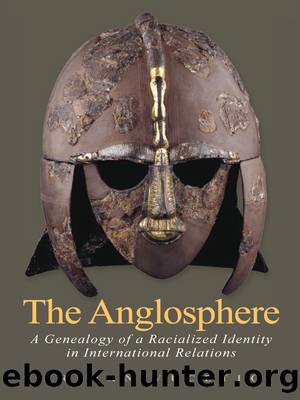The Anglosphere by Srdjan Vucetic

Author:Srdjan Vucetic
Language: eng
Format: epub
Publisher: Stanford University Press
Published: 2011-06-14T16:00:00+00:00
6 THE ANGLOSPHERE AND ITS LIMITS
All the people like us are We/And every one else is They.
—Rudyard Kipling, “We and They,” 1919
Questions of identity may insinuate their way into all forms of politics, but all forms of politics are not about questions of identity.
—Gearóid Ó Tuathail, “Dissident IR and the Identity Politics Narrative,” (1996)
During the past three centuries the spread of the English-speaking peoples over the world’s waste spaces has been not only the most striking feature in the world’s history, but also the event of all others most far-reaching in its effects and its importance.
—Theodore Roosevelt, The Winning of the West, Vol.1 (1889)
RUDYARD KIPLING’S EARLY-TWENTIETH-CENTURY poetical reflections on a binary logic to cultural, civilizational, and imperial interactions capture the politics of identity, which has been the conceptual and theoretical foundation of this genealogy. We–they dynamics have indeed been borne out in each of the preceding chapters, even if my story is more complicated than simple Anglos-versus-the rest binarizations would allow. I have indeed argued that the Anglosphere came into existence through a variety of social and political inclusions and exclusions on multiple levels of analysis—at home, abroad, and in-between. The special relationships that crisscross the putative core of this community were once based on claims of shared Anglo-Saxonism, while today they rest primarily on claims of liberal internationalism.
As identity alone does not and cannot capture all relevant questions and answers in the study of world politics, I will now relate my Anglosphere story back to IR, both theoretically and substantively. My goal in this chapter is to clarify and elaborate the main strengths and weaknesses of my arguments, findings, and puzzles. I will begin with a short overview of the theoretical argument made in the book and then move on to engage select IR theories on hegemony, appeasement, balancing, the Kantian peace, security communities, hierarchy, empire, networks, and power. Here, I will evaluate various knowledge claims, which may be regarded as alternative, complementary, or otherwise relevant to the story told in previous chapters. Where appropriate, I will also make a note of further research areas and, indeed, policy relevance of my findings. The very last section will include a brief reflection on the future of the Anglosphere.
Download
This site does not store any files on its server. We only index and link to content provided by other sites. Please contact the content providers to delete copyright contents if any and email us, we'll remove relevant links or contents immediately.
| Arms Control | Diplomacy |
| Security | Trades & Tariffs |
| Treaties | African |
| Asian | Australian & Oceanian |
| Canadian | Caribbean & Latin American |
| European | Middle Eastern |
| Russian & Former Soviet Union |
The Secret History by Donna Tartt(16606)
The Social Justice Warrior Handbook by Lisa De Pasquale(11485)
Thirteen Reasons Why by Jay Asher(7779)
This Is How You Lose Her by Junot Diaz(5751)
Weapons of Math Destruction by Cathy O'Neil(5027)
Zero to One by Peter Thiel(4815)
The Myth of the Strong Leader by Archie Brown(4784)
Promise Me, Dad by Joe Biden(4439)
Stone's Rules by Roger Stone(4409)
Beartown by Fredrik Backman(4399)
How Democracies Die by Steven Levitsky & Daniel Ziblatt(4391)
The Fire Next Time by James Baldwin(4336)
100 Deadly Skills by Clint Emerson(4070)
A Higher Loyalty: Truth, Lies, and Leadership by James Comey(4024)
Rise and Kill First by Ronen Bergman(4008)
The David Icke Guide to the Global Conspiracy (and how to end it) by David Icke(3875)
The Farm by Tom Rob Smith(3869)
Secrecy World by Jake Bernstein(3773)
The Doomsday Machine by Daniel Ellsberg(3725)
